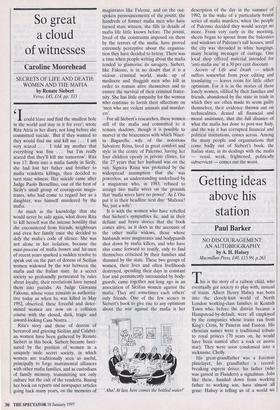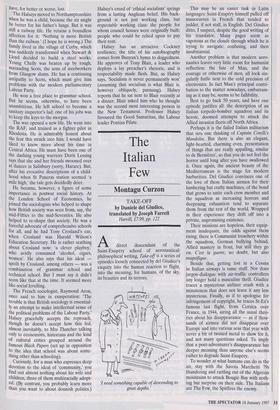Getting ideas above his station
Paul Barker
NO DISCOURAGEMENT: AN AUTOBIOGRAPHY by A. H. Halsey Macmillan Press, £40, £15.99, p.263 This is the story of a railway child, who eventually got society to play with, instead of trains. Albert Henry Halsey was born into the closely-knit world of North London working-class families in Kentish Town who, before the district became a Hampstead-by-default, were all employed by the companies whose trains ran from King's Cross, St Pancras and Euston. His christian names were a traditional tribute to royal princes (70 years on, he would have been named after a rock or movie star). They were soon condensed into a nickname, Chelly.
His great-grandfather was a foreman platelayer, his grandfather a record- breaking express driver, his father (who was gassed in Flanders) a signalman. Jobs like these, handed down from working father to working son, have almost all gone: Halsey is telling us of a world we have, for better or worse, lost.
The Halseys moved to Northamptonshire when he was a child, because the air might be better for his father's lungs. But it was still a railway life. He retains a boundless affection for it: 'Nothing is more British than the railway.' (I hope he is wrong.) The family lived in the village of Corby, which was suddenly transformed when Stewart & Lloyd decided to build a steel works. Young Chelly was beaten up by tough, marauding Scots, the sons of steelworkers from Glasgow slums. He has a continuing antipathy to Scots, which must give him problems with the modern parliamentary Labour Party.
He won a free place to grammar school. But he seems, otherwise, . to have been unambitious. He left school to become a sanitary inspector's lad; one of his jobs was to keep the keys to the morgue.
The war opened a new life. He went into the RAF, and trained as a fighter pilot in Rhodesia. He is admirably honest about the fear this struck into him. I would have liked to know more about his time in Central Africa, He must have been one of the dashing young warriors Doris Lessing says that she and her friends swooned over at dances in Salisbury (sorry, Harare). But, after his evocative descriptions of a child- hood when St Pancras station seemed 'a mile high,' the tale gets decidedly drier.
He became, however, a figure of some importance in postwar social history. At the London School of Economics, he joined the sociologists who helped to shape how British society was seen from, say, the mid-Fifties to the mid-Seventies. He also helped to re-shape that society. He was a forceful advocate of comprehensive schools for all, and he had Tony Crosland's ear, when Crosland was Harold Wilson's Education Secretary. He is rather scathing about Crosland now: 'a clever playboy,' who avidly consumed 'alcohol, cigars, women'. He also says that his ideal spoilt by Crosland, among others — was a combination of grammar school and technical school. But I must say it didn't seem like that at the time. It seemed more like social levelling.
The French sociologist, Raymond Aron, once said to him in exasperation: 'The trouble is that British sociology is essential- ly an attempt to make intellectual sense of the political problems of the Labour Party.' Halsey gracefully accepts the reproach, though he doesn't accept how this led, almost inevitably, to Mrs Thatcher talking only to economists, historians and the kind of cultural critics grouped around the famous Black Papers (set up in opposition to the idea that school was about some- thing other than schooling).
Curiously, for a man who expresses deep devotion to the ideal of 'community,' you find out almost nothing about his wife and children, three of them multiracially adopt- ed. (By contrast, you probably learn more than you want to about donnish politics.) Halsey's creed of 'ethical socialism' springs from a lasting Anglican belief. His back- ground is not just working class, but respectable working class: the people for whom council houses were originally built; people who could be relied upon to pay their rent.
Halsey has an attractive Cockney resilience; the title of his autobiography comes from Bunyan's hymn to doggedness. He approves of Tony Blair, a leader who deploys a lay preacher's rhetoric, and is respectability made flesh. But, as Halsey says, 'Socialism is never permanently won' (assuming that socialism is what Blair is, however obliquely, pursuing). Halsey reports that he sat next to Blair recently at a dinner. Blair asked him who he thought was the second most interesting person in the New Testament. Professor Halsey favoured the Good Samaritan, the Labour leader Pontius Pilate.



























































 Previous page
Previous page